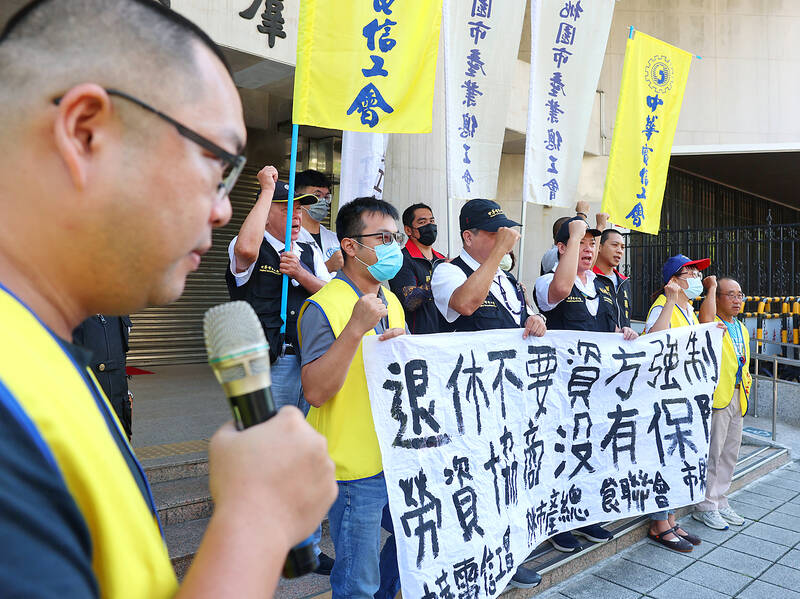Taiwan climbed one notch to 39th among 48 economies in the annual Mercer CFA Institute Global Pension Index, which grades individual pension systems in terms of adequacy, sustainability and integrity against more than 50 indicators, a survey released on Tuesday by US human resource consulting firm Mercer showed.
“In a world where fertility rates are falling and life expectancy is rising, retirement income systems are center stage,” Mercer president and chief executive Pat Tomlinson said.
Ensuring strong alignment in private and public retirement income arrangements, increasing employee coverage and encouraging higher labor force participation for those who wish to work at older ages are just a few ways to improve long-term outcomes for retirees, Tomlinson said.

Photo: CNA
The Netherlands had the highest overall index value of 84.8, closely followed by Iceland at 83.4 and Denmark at 81.6, with Mercer giving an “A” grade to pension systems with index values of more than 80.
Taiwan’s index value of 53.7, slightly up from 53.6 last year, earned it a “C” grade behind Vietnam, Japan, China and Malaysia, but ahead of Austria, South Korea, Indonesia and Thailand, Mercer said.
C-grade pension systems have some good features, but also have major risks and much room for improvement, it said.
Taiwan’s retirement income system consists of an earnings-related public pension and a national labor pension scheme in which the employer contributes 6 percent or more of a worker’s monthly wage into an individual pension account overseen by the Bureau of Labor Insurance, it said.
Upon reaching age 60, a worker can apply to the Bureau of Labor Insurance to receive the principal and investment earnings, it said.
Taiwan’s pension system could be enhanced by increasing the minimum level of support for the poorest people, increasing the labor force participation rate at older ages and lifting the state pension age as life expectancies increase, the consultancy firm said.
In Asia, Singapore maintained its top position advancing from seventh to fifth place this year, it said.
The concept of retirement is shifting and many people are transitioning gradually to retirement or rejoining the workforce in a different capacity after their initial retirement, Mercer said.
Increasing longevity, high interest rates and rising healthcare costs have put increased pressure on government budgets around the world to support pension programs, it said.
Now is the time for governments, policymakers, the pension industry and employers to work together to ensure that older populations are treated with dignity and can maintain a lifestyle similar to what they experienced through their working years, it added.

BYPASSING CHINA TARIFFS: In the first five months of this year, Foxconn sent US$4.4bn of iPhones to the US from India, compared with US$3.7bn in the whole of last year Nearly all the iPhones exported by Foxconn Technology Group (富士康科技集團) from India went to the US between March and last month, customs data showed, far above last year’s average of 50 percent and a clear sign of Apple Inc’s efforts to bypass high US tariffs imposed on China. The numbers, being reported by Reuters for the first time, show that Apple has realigned its India exports to almost exclusively serve the US market, when previously the devices were more widely distributed to nations including the Netherlands and the Czech Republic. During March to last month, Foxconn, known as Hon Hai Precision Industry

Taiwan Semiconductor Manufacturing Co (TSMC, 台積電) and the University of Tokyo (UTokyo) yesterday announced the launch of the TSMC-UTokyo Lab to promote advanced semiconductor research, education and talent development. The lab is TSMC’s first laboratory collaboration with a university outside Taiwan, the company said in a statement. The lab would leverage “the extensive knowledge, experience, and creativity” of both institutions, the company said. It is located in the Asano Section of UTokyo’s Hongo, Tokyo, campus and would be managed by UTokyo faculty, guided by directors from UTokyo and TSMC, the company said. TSMC began working with UTokyo in 2019, resulting in 21 research projects,

Ashton Hall’s morning routine involves dunking his head in iced Saratoga Spring Water. For the company that sells the bottled water — Hall’s brand of choice for drinking, brushing his teeth and submerging himself — that is fantastic news. “We’re so thankful to this incredible fitness influencer called Ashton Hall,” Saratoga owner Primo Brands Corp’s CEO Robbert Rietbroek said on an earnings call after Hall’s morning routine video went viral. “He really helped put our brand on the map.” Primo Brands, which was not affiliated with Hall when he made his video, is among the increasing number of companies benefiting from influencer

Quanta Computer Inc (廣達) chairman Barry Lam (林百里) yesterday expressed a downbeat view about the prospects of humanoid robots, given high manufacturing costs and a lack of target customers. Despite rising demand and high expectations for humanoid robots, high research-and-development costs and uncertain profitability remain major concerns, Lam told reporters following the company’s annual shareholders’ meeting in Taoyuan. “Since it seems a bit unworthy to use such high-cost robots to do household chores, I believe robots designed for specific purposes would be more valuable and present a better business opportunity,” Lam said Instead of investing in humanoid robots, Quanta has opted to invest